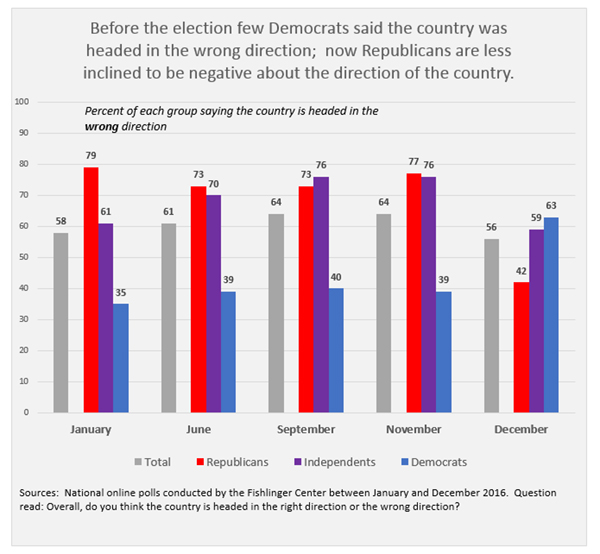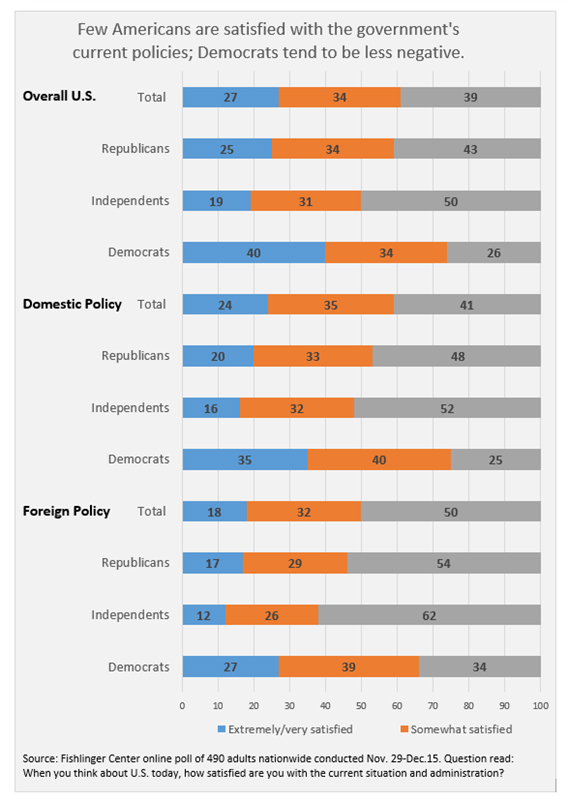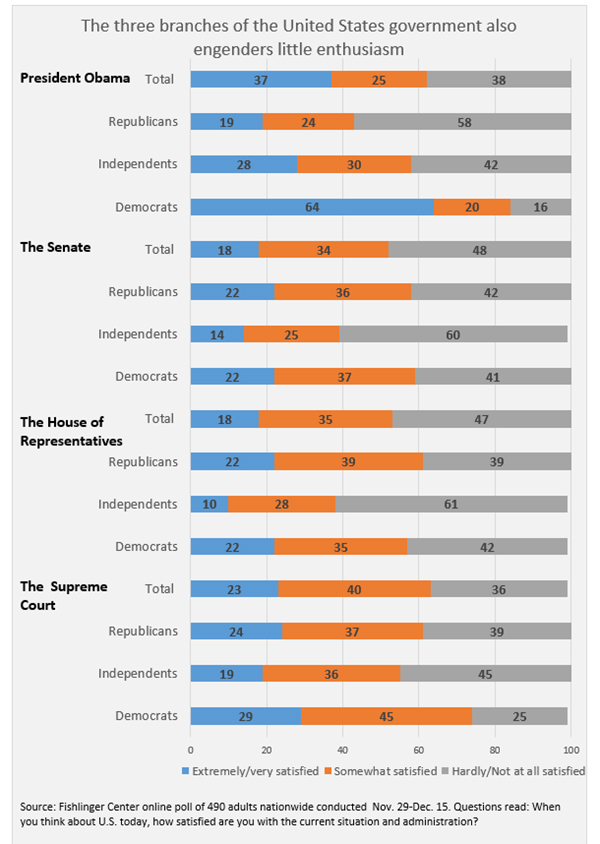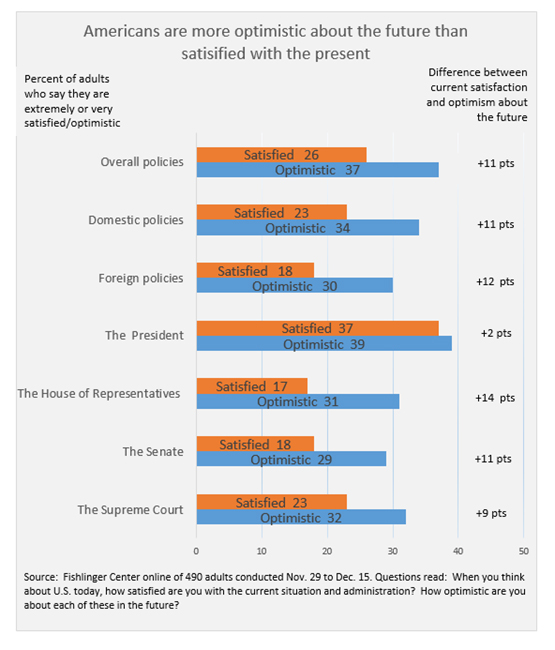Public Sentiment at the End of 2016
1/13/2017
Direction of the Country
Most Americans continue to say the country is headed in the wrong direction and few are happy any feature of the government or its policies. However, as with most aspects of life in Washington these days, there are substantial partisan divisions. In the wake of Donald Trump’s election as president, a recent poll finds most Americans with a negative view of the recent election process. Republicans, unsurprisingly, are the exception.
The nationwide online poll was conducted November 29-December 15 with 490 adults by the Fishlinger Center for Public Policy Research at the University of Mount Saint Vincent,
Republicans and Democrats have both had an about-face regarding the direction of the country. Last January, 42 percent of the public overall said the country was on the right track and 58 percent said it was headed in the wrong direction. In the latest poll, the overall numbers are just about the same: 44 percent say the country is on the right course and 56 percent say it is on the wrong track.
Fifty-eight percent of Republicans and 41 percent of independents say the country is headed in the right direction but only 37 percent of Democrats agree. Last January, Democrats were more likely than independents or Republicans to say the country was headed in the right direction (65 percent vs. 21 percent and 39 percent, respectively).

The Election Process
After January 20, the Republicans will control both houses of Congress and the Whites House. So, perhaps predictably, 60 percent of Republicans rate the recent election as excellent or very good. Only 31 percent of Democrats and 32 percent of independents agree.
In comparison, last January before the primaries started, 44 percent of Democrats said they were extremely or very satisfied with the election process, while only 27 percent of Republicans and 23 percent of independents concurred.

Government Policy
Few Americans are particularly enthusiastic about the country’s policies, whether considering them as a whole or looking specifically at domestic and foreign policies. Independents are most negative about the government. Democrats, at least while Barack Obama is still in office, are most positive. After Inauguration Day, it’s likely that Republicans will be more positive.

Branches of Government
Regarding President Obama, Democrats continue to hold a very positive view, while Republicans maintain their negative impression of him. There is less partisan differences regarding Congress. Less than a quarter of both Republicans and Democrats say they are extremely or very satisfied with either the Senate or the House of Representatives. Independents are even more disgruntled: less than 15 percent are satisfied with either chamber.
The Supreme Court is viewed more favorably by the public than the legislature. Twenty-three percent of the public are extremely or very satisfied and another 40 percent are somewhat satisfied.

Looking Ahead
Americans generally express more optimism about the future than satisfaction with the present. However, often Republicans are more optimistic about the future that Democrats. For example, 23 percent of Republicans are extremely or very satisfied with overall U.S. government policy, but 53 percent are optimistic about future U.S. policy. In contrast, 40 percent of Democrats are satisfied with current U.S. policy while 36 percent have a positive outlook for the future.
When it comes to the president, however, satisfaction with Obama and optimism for Trump are very close with 37 percent satisfied with Obama vs 39 percent optimistic about Trump. This does not convey a typical “honeymoon” period for the incoming president and suggests a fair degree of skepticism for him as president.
The support is polarized by party affiliation, 64 percent of Democrats are extremely or very satisfied with Mr. Obama; only 19 percent of Republicans agree. Looking toward the next president, only 24 percent of Democrats are hopeful while 63 percent of Republicans are hopeful about the next administration. There is not much difference between the current satisfaction independents and their outlook on the future.
The difference between satisfaction and optimism will be important to monitor during the transfer of power in coming weeks and beyond as the new administration takes the helm.

Survey Methodology
The Fishlinger Center conducts online national surveys focusing on political issues in the United States. The fieldwork for the polls is conducted using a blended national panel from Survey Sampling Inc. Interviews for the latest poll were conducted Nov. 29 through Dec. 15 with 490 adults. The credibility interval is plus or minus 4 percentage points.
In addition to credibility interval, the polls are subject to other potential sources of error including, but not limited to coverage and measurement error. Data were rim weighted to match the national population on age, sex, Hispanic origin and race. Question wording and topline results are available at fishlingercenter@mountsaintvincent.edu.
About the Fishlinger Center for Public Policy
The Fishlinger Center for Public Policy Research opened in February 2015 at the University of Mount Saint Vincent. The Center, a member of the American Association for Public Opinion Research (AAPOR), conducts deep and broad studies of public opinion on key public policy concerns through independent and objective research conducted by students, faculty, and other members of the academic community.
By providing a forum for discourse that can stimulate intelligent dialog about issues that deeply affect all Americans, the Center illustrates and enhances the relationship between the work of the College and the common good.
About the University of Mount Saint Vincent
Founded in 1847 by the Sisters of Charity, the University of Mount Saint Vincent offers nationally recognized liberal arts education and a select array of professional fields of study on a landmark campus overlooking the Hudson River. Committed to the education of the whole person, and enriched by the unparalleled cultural, educational and career opportunities of New York City, the College equips students with the knowledge, skills and experiences necessary for lives of achievement, professional accomplishment and leadership in the 21st century.
